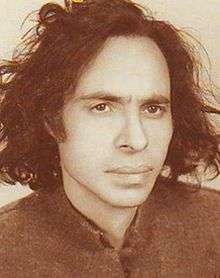Jaun Elia
Syed Sibt-e-Asghar Naqvi, commonly known as Jaun Elia (Urdu: جون ایلیا, 14 December 1931 – 8 November 2002), was a Pakistani Urdu poet, philosopher, biographer, and scholar. He was the brother of Rais Amrohvi and Syed Muhammad Taqi, who were journalists and psychoanalysts. He was fluent in Urdu, Arabic, English, Persian, Sanskrit and Hebrew. One of the most prominent modern Pakistani poets, popular for his unconventional ways,[1] he "acquired knowledge of philosophy, logic, Islamic history, the Muslim Sufi tradition, Muslim religious sciences, Western literature, and Kabbala."[2]
Jaun Elia | |
|---|---|
 | |
| Native name | جون ایلیا |
| Born | 14 December 1931 Amroha, United Provinces, British India |
| Died | 8 November 2002 (aged 70) Karachi, Sindh, Pakistan |
| Occupation | Urdu Poet, scholar philosopher |
| Nationality | Pakistani |
| Education | Philosopher, biographer, and scholar |
| Genre | Ghazal poetry |
| Notable works | Shayad, Yani, Lekin, Gumman, Goya, Farnod |
| Spouse | |
| Children | 3 |
Early life
Jaun Elia was born Syed Sibt-e-Ashgar Naqvi[3] on 14 December 1931 in Amroha, British India.[4] His father, Shafiq Elia, was a scholar of literature and astronomy well-versed in the Arabic, English, Persian, Hebrew and Sanskrit languages, and who corresponded with leading intellectuals like Bertrand Russell.[5] He was the youngest of his siblings. Rais Amrohvi was his elder brother. Indian film director Kamal Amrohi was his first cousin.[6]
Described as a child prodigy, he was initially educated at the Syed-ul-Madaris in Amroha, a madrassah associated with the Darul Uloom Deoband, despite his family being Shia.[7]
During his youth, Pakistan became an independent Muslim state. Being a communist, Elia was averse to the idea, but finally accepted it as a compromise.[8] He migrated to Pakistan in 1957, and decided to live in Karachi. Poet Pirzada Qasim said:
Jaun was very particular about language. While his diction is rooted in the classical tradition, he touches on new subjects. He remained in quest of an ideal all his life. Unable to find the ideal eventually, he became angry and frustrated. He felt, perhaps with reason, that he had squandered his talent.[9]
He began writing poetry at the age of 8 but published his first collection, Shayad, when he was 60.[10]
He married writer Zahida Hina in 1970[11] and they separated in 1992.[12]
Works
Poetry collections
- Sukhan Meri Udasee Hai
- Zakham-e-Umeed - زخمِ امید
- Mubada
- Tumharey Aur Mere Darmiyan
- Daricha Haye Kheyal
- Qitaat
- Jaun Elia Ki Tamam Ghazlain (parts I-III)
- Inshaye aur Mazaameen
- Farnood
Prose work (mainly translations)
Elia was not just a poet but was also an editor and a translator, especially of old Sufi, Mutazili and Ismaili treatises.
- Masih-i-Baghdad Hallaj,
- Jometria,
- Tawasin,
- Isaghoji,
- Rahaish-o-Kushaish,
- Hasan bin Sabah
- Farnod, Tajrid,
- Masail-i-Tajrid,
- Rasail Ikhwan al Safa
Above are some of his translations from Arabic and Persian. Not only did he translate these books but also introduced several new words in Urdu language.[13]
Theme
His poetry is known for its unending pain. He expressed the pain and sorrow in distinct way that anyone could get influenced by his poetry. We get the flow of pain that his counterparts are lacking. Jaun Elia was nihilist and anarchist as well he had a distinguished philosophy of love in his poetry. According to him, the highest level of love is in actual the Beginning of separation from lover. As he says : {You are coming very close to me, Have you decided to leave?} بہت نزدیک آتی جا رہی ہو ۔۔بچھڑنے کا ارادہ کرلیا کیا؟ And also : {What did you say? Love is eternal! کیا کہا محبت جاودانی ہے؟آخری بار مل رہی ہو کیا؟ Is this last meeting of us? } He also wrote poetry about love, philosophy of love life, but he is well-known as a poet of pain.
See also
References
- "Ghazals of Jaun Eliya | Rekhta". Rekhta. Retrieved 10 November 2016.
- "Urdu poet Jaun Elia remembered on 10th death anniversary". The Express Tribune. 8 November 2012. Retrieved 16 November 2016.
- Iftikhar Alam (9 November 2016), "Jani! kya aaj meri barsi hai–Yani kya aaj mar gya tha main?", Dawn News. Retrieved 26 October 2019.
- "In search of Jaun Elia". The Tribune , India.
- Salman Altaf (5 November 2017), "ESSAY: THE ELIA PARADOX", Dawn News. Retrieved 15 October 2019.
- Manzoor Kureshi (4 April 2014). "In the name of father". Dawn. Retrieved 26 March 2018.
- "KARACHI: Jon knew how to enthral audience", Dawn News. Retrieved 26 October 2019.
- "Ghazals of Jaun Eliya | Rekhta". Rekhta. Retrieved 10 November 2016.
- Samiuddin, Abida (2007). Encyclopaedic Dictionary of Urdu Literature (2 Vols. Set). Global Vision Publishing. p. 201. ISBN 9788182201910.
- Staff Reporter (15 December 2018), "Jaun Elia remembered", The Nation. Retrieved 26 October 2019.
- Gitanjali Dang and Khanabadosh, "Inhabiting Urdu with Jaun Elia and Khwaab Tanha", FirstPost. Retrieved 26 October 2019.
- "KARACHI: Jon knew how to enthral audience", Dawn News. Retrieved 26 October 2019.
- "Jaun Elia - An anarchist, a nihilist and a poet - Pakistan - Dunya News". Retrieved 15 July 2016.